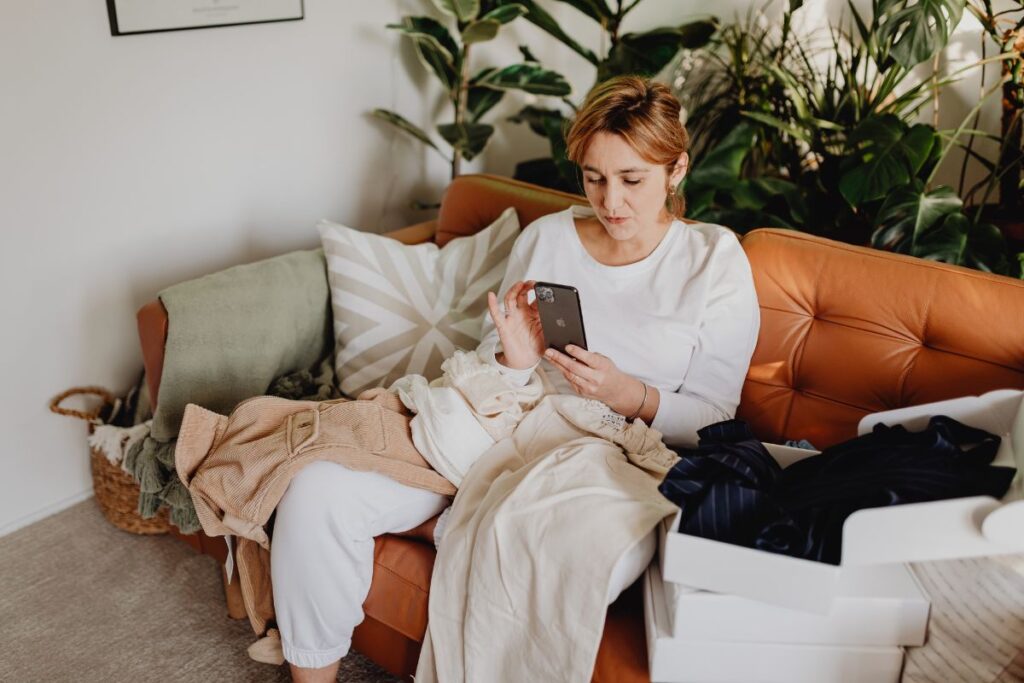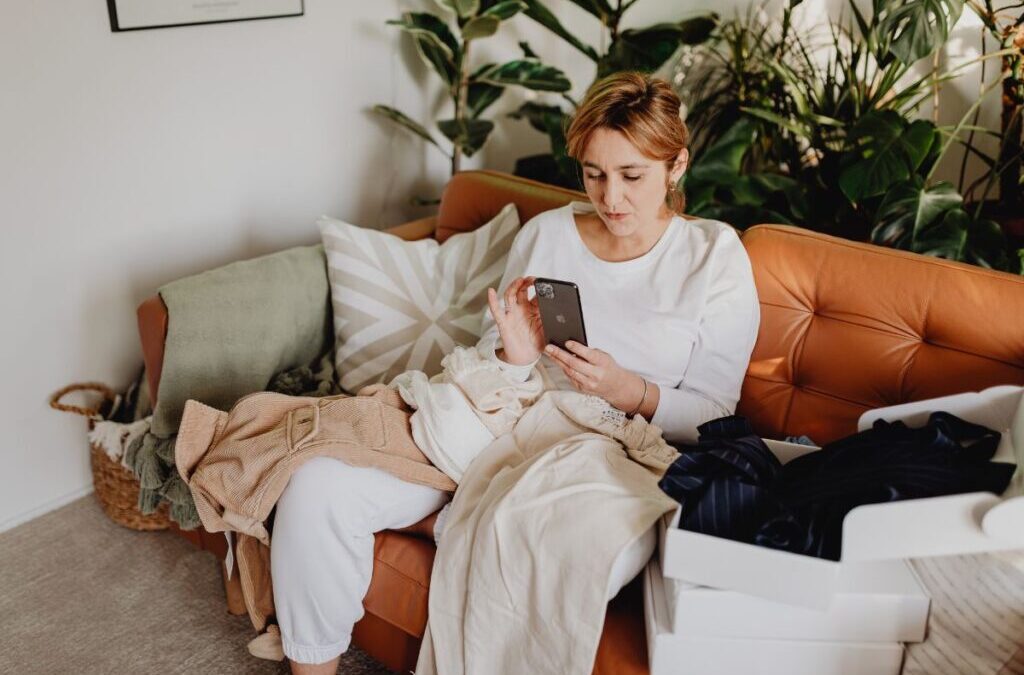Inside: Consider the hidden cost of clutter and how your stuff can steal your joy and peace.
In a world that often equates success with the accumulation of physical stuff, it’s easy to find ourselves surrounded by too much.
What begins as harmless collecting or taking advantage of a great deal can slowly evolve into a cluttered existence that silently drains our energy.
While we may not always realize it, our possessions can carry an emotional weight far heavier than their physical presence.
The appeal of having more is deeply ingrained in modern culture, fueled by marketing messages that remind us that happiness is just one more purchase away.
But in reality, the constant pursuit of more often leads to less – less peace, less clarity, and less joy.
As stuff adds up, so does the hidden cost of clutter, not just in money or space, but in our emotional well-being, relationships, and overall quality of life.

The Hidden Cost of Clutter: 7 Ways Your Stuff is Stealing Your Joy & Peace
There is a hidden cost of clutter, and there are a variety of ways that having too much stuff can negatively impact your life.
1. Clutter Increases Stress and Mental Overload
Clutter doesn’t just create a messy space; it creates a messy mind.
Studies have shown that living in a cluttered environment can significantly increase levels of cortisol, the stress hormone.
The constant visual reminder of disorganization signals the brain that work is never done. Even if we try to ignore it, the clutter reminds us that there’s always something else we should be taking care of.
This low-level, chronic stress can have far-reaching impacts. It can make it harder to focus, disrupt our sleep, and contribute to feelings of anxiety and depression.
For some, clutter becomes a source of shame, causing embarrassment or social withdrawal. Hosting guests, inviting friends over, or even just relaxing in your own space becomes uncomfortable, if not impossible.

2. Clutter Leads to Financial Waste and Debt
Beyond the emotional toll, clutter can make a pretty big impact on your financial well-being. Every item in your home symbolizes a financial choice.
When we accumulate stuff without intention, we end up spending on things we don’t truly need or value. These purchases add up and materialize as credit card debt and overdrawn accounts, leading to unnecessary stress.
One of the biggest contributors to this problem is that clutter makes it impossible to find the things we already own, leading to duplication.
Can’t find the scissors? Buy another pair. Misplaced your phone charger? Don’t look too hard – just add a new one to the cart.
Over time, these small expenses snowball. Meanwhile, storage solutions, organizing containers, and even off-site storage units become ongoing costs to manage stuff we don’t need.

3. Clutter Can Create Conflict in Relationships
Clutter doesn’t just affect us as individuals. Having too much stuff impacts our families and takes a toll on our relationships, too.
Whether you live with a spouse, roommates, or family members, you probably know that messes can quickly become a point of contention. Disagreements over cleaning, organizing, or hoarding habits can lead to friction and resentment.
For couples, clutter can symbolize deeper disconnects. One partner may feel unsupported or unheard when their desire for a tidy environment is ignored.
The other may feel criticized or controlled. In families, cluttered environments can make it harder to establish routines, maintain calm, or encourage responsibility in children.
Instead of the home being a sanctuary, it becomes a source of stress and anxiety.

4. Clutter Can Represent Our (Not So Great) Emotions
There are a number of common reasons that people hold onto clutter. Every pile, every drawer full of unused gadgets, and every bag of unworn clothes tells a story.
Sometimes it’s a story of good intentions, like the yoga mat for the healthy lifestyle we haven’t yet embraced, or the untouched sewing machine bought during a creative phase that never quite took off.
Other times, it’s a tale of fear, of letting go, of change, or of confronting the past.
Clutter can also reflect unresolved emotions. We may feel regret for money spent unwisely, guilt for not using or appreciating what we have, or shame over not maintaining control.
The presence of these items can serve as daily reminders of where we feel we’ve fallen short. This silent messaging chips away at our self-esteem, reinforcing a cycle of self-doubt.

5. Clutter Drains Your Mental Energy
Every item in our environment requires a micro-decision. Do I keep it? Move it? Clean it? Use it? Ignore it? These constant decisions can be exhausting.
This is known as decision fatigue, and it quietly erodes our ability to make choices throughout the day. When clutter surrounds us, our brains stay on alert, constantly processing stimuli, leading to mental overload.
The weight of so many small decisions can contribute to burnout. You might notice that after spending a weekend tidying up your space, you still don’t feel lighter.
That’s because you may have only shifted the stuff around without addressing the root cause. Without a shift in mindset, the cycle continues, and the mental toll deepens.

6. Clutter Makes It Harder to Let Go Emotionally
Emotional attachment is one of the biggest reasons we struggle to get rid of clutter. We assign memories, hopes, and even identities to our physical possessions.
Letting go of a childhood toy, a faded dress, or a box of college notebooks can feel like letting go of a part of ourselves.
When we learn to let go of our fantasy self and detach our self-worth from our belongings, we open the door to a more peaceful existence.
The act of letting go becomes a form of healing, of reclaiming our space and our sense of agency. It creates room, literally and figuratively, for the things that truly matter.

7. Clutter Often Hides Deeper Emotional Struggles
Sometimes, clutter is not the core problem but a symptom of something deeper. It can mask grief, trauma, or a sense of purposelessness. It can be tied to emotional clutter that manifests itself as physical clutter.
People who are overwhelmed by life often find that their surroundings reflect that internal chaos. For some people, decluttering isn’t just a matter of organization but of emotional processing.
It’s important to approach this work with compassion and give yourself grace. Try to reframe your thought process around your physical space.
Instead of wondering why you’re so messy, try asking yourself what you’re holding onto that makes your space feel so overwhelming – and, more importantly, why you can’t let it go.
This reframing invites curiosity instead of judgment and creates space for meaningful change.
What has been the hidden cost of clutter in your life? Share your thoughts in the comments below.
Sign up on the form below to get weekly decluttering tips sent straight to your inbox. You’ll also get the free Your Home Decluttered Jumpstart which includes 100 easy items to declutter and 12 high-impact areas to declutter in 10 minutes.

